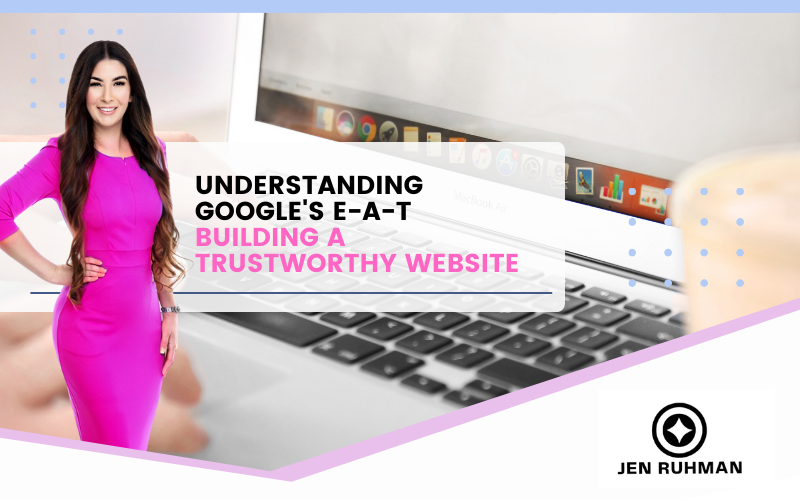Understanding Google’s E-A-T Guidelines and Their Impact on SEO:
Your Guide to Building a Trustworthy Website
Hey everyone, Jen Ruhman here, owner of Jen Ruhman SEO in sunny San Diego! Today, I want to talk about something that’s become a hot topic in the SEO world: Google’s E-A-T guidelines.
Let’s face it, ranking well on Google can feel like a mystery sometimes. You write great content, you optimize your website, but those top spots on the search results page still seem out of reach. Well, E-A-T might be the missing piece of the puzzle.
What is E-A-T?
E-A-T stands for Expertise, Authoritativeness, and Trustworthiness. It’s a framework that Google uses to assess the quality and credibility of websites. In simpler terms, Google wants to show users search results that come from reliable sources, written by people who actually know what they’re talking about.
Think about it this way. If you’re searching for information on how to fix a leaky faucet, wouldn’t you feel more confident following instructions from a licensed plumber rather than a random blog post? That’s exactly what Google wants: to connect users with the best possible information.
Why Should You Care About E-A-T?
Here’s the deal: E-A-T matters for every website, not just those in super serious fields like medicine or finance. Whether you’re running a baking blog or a dog walking service website, building trust and authority with Google is key to ranking higher and attracting more visitors.
Industries That Need More Time to Earn Google’s Trust
I see it all the time with my clients. They put a lot of effort into traditional SEO tactics like keyword stuffing, but their content just doesn’t cut it. It lacks depth, originality, or simply isn’t trustworthy. Google can sniff that out a mile away, and your website gets buried in the search results.
Breaking Down E-A-T:
Now, let’s dive deeper into each element of E-A-T and see how you can implement it on your website:
1. Expertise
This means showing Google that you’re a true expert in your field.
- Content Depth: Go beyond surface-level information. Dive deep into your topic, providing valuable insights and unique perspectives.
- Case Studies & Research: Have you conducted your own research or have real-world experience? Showcase it! This adds credibility and positions you as an authority.
- Author Credentials: Are you a certified dog walker? A baker with years of experience? Highlight your qualifications and expertise on your website. Even for more casual topics, showcasing your passion and knowledge goes a long way.
Remember: Expertise isn’t just about fancy degrees or certifications. It’s about genuine knowledge and a passion for your subject.
For example, I might not have a Ph.D. in SEO, but I’ve been working in this field for over 10 years. I’ve helped countless businesses improve their online presence, and I’m constantly learning and staying up-to-date on the latest trends. That’s the kind of expertise that Google recognizes.
2. Authoritativeness
Think of authoritativeness as your website’s reputation. Here’s how to build it up:
- High-Quality Backlinks: Getting other reputable websites to link back to yours is a major trust signal for Google. It shows that others recognize your expertise and value your content.
- Guest Posting: Contribute guest articles to other well-respected websites in your niche. This not only builds backlinks but also expands your reach and establishes you as an authority.
- Industry Recognition: Have you been featured in any publications or won any awards? Showcase them! This further strengthens your authoritativeness.
3. Trustworthiness
This is all about building user trust and making your website a safe and reliable space.
- Accurate & Up-to-Date Content: Double-check your facts! Ensure your information is accurate, current, and reflects the latest best practices.
- Transparency: Be upfront about who you are and what you do. Clearly display your contact information and have a well-defined privacy policy.
- Website Security: Make sure your website uses HTTPS encryption. This shows users that their data is secure and builds trust.
E-A-T for Different Industries:
While E-A-T is crucial for all websites, it holds even greater weight in certain industries:
- Health & Wellness: When it comes to medical advice, Google prioritizes content from qualified professionals and backed by scientific evidence.
- Finance: Similar story here. Financial advice can have major consequences, so Google wants to make sure you’re qualified to give it.
- News & Information: In a world filled with fake news, Google relies on E-A-T to separate the real from the fake. Trustworthy journalism, fact-checking, and transparent sourcing are essential.
Measuring Your E-A-T Success:
So, how do you know if your E-A-T efforts are paying off?
- Track Your Rankings: Are you climbing the search engine results pages? That’s a good sign!
- Check Your Traffic: Are more people visiting your website? Are they staying longer and engaging with your content?
- Monitor Backlinks: Are you building high-quality backlinks from reputable websites?
- User Feedback: What are your users saying about your website? Are they finding your content helpful and informative?
Remember, E-A-T is an ongoing process. It’s not something you can just fix and forget about. You need to consistently create high-quality content, build relationships, and maintain a trustworthy website.
Common E-A-T Mistakes:
I see a lot of websites making these E-A-T mistakes:
- Ignoring Content Quality: Focusing too much on keyword stuffing and not enough on creating valuable content.
- Neglecting Website Security: A website without HTTPS is a major red flag for users and Google.
- Underestimating Author Credentials: People want to know who’s behind the content. Highlight your expertise and qualifications.
Building a strong E-A-T foundation is essential for long-term SEO success. By focusing on expertise, authoritativeness, and trustworthiness, you’ll not only improve your search rankings but also build a loyal audience that trusts your brand.
FAQs:
- Is E-A-T relevant for all types of websites? While E-A-T is particularly important for websites in the health, finance, and news industries, it’s relevant for all types of websites. Any site that wants to rank well on Google should prioritize E-A-T.
- How often should I update my content to maintain E-A-T? Regularly updating your content is crucial for maintaining E-A-T. This ensures that your information remains accurate, relevant, and trustworthy.
I hope this guide has been helpful! Remember, building a strong online presence takes time and effort. But by focusing on E-A-T, you’ll be well on your way to achieving your SEO goals.
Would you like to dive deeper into a specific aspect of E-A-T, or do you have any other questions?
Ready to boost your website’s visibility and attract more customers? Let’s put your E-A-T strategy into action! As a top SEO company in San Diego, contact Jen Ruhman SEO today for a free consultation and discover how we can help you dominate the search engine rankings.
Visit https://jenruhman.com/ or call/text me at (619) 719-1315 to get started.


